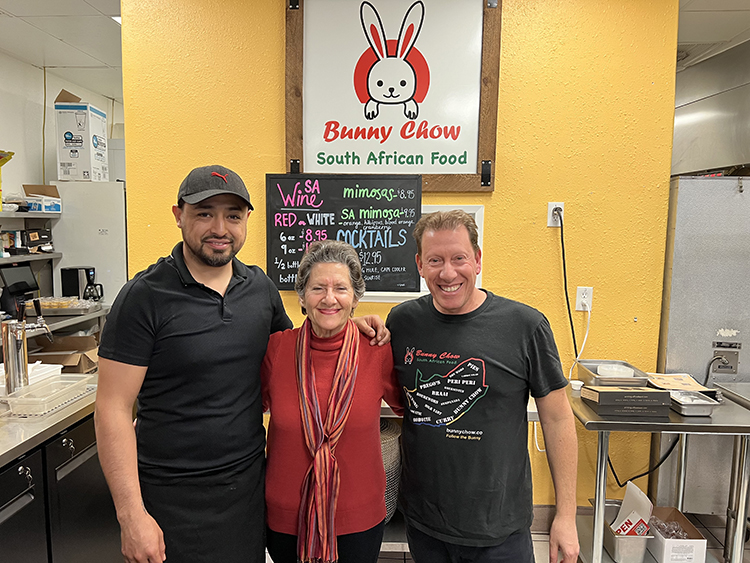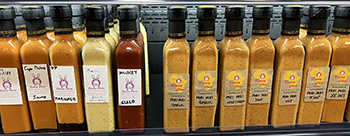
By Donald H. Harrison

SAN DIEGO – Ask a typical San Diegan what “Bunny Chow” is, and he or she might respond “lettuce, I guess.”
Ask a typical immigrant from South Africa, and he or she might respond, “Mmmm, one of my favorite dishes from back home.”
Now, Gary Wolfson and Andrew Georgitsis have partnered at the informal “Bunny Chow” restaurant in the Mira Mesa area of San Diego, featuring not only bunny chow but other South African dishes reflecting that country’s ethnic diversity.
Here you can have various kinds of curries, boerewors, bobotie, or even a monkey gland burger. You can season these specialties with Peri Peri, Cape Malay Sauce, or Monkey Gland Sauce.
So, perhaps, some definitions are in order.
Bunny Chow is the name given to a hollowed-out quarter loaf of bread into which various kinds of curries can be poured. Push up two sides of the bread to make it look like bunny ears, and you have one explanation for the name “bunny chow.” Another is that the workers from India who introduced the food in Durban, South Africa, were Bunea, the third of the four Hindu castes. “Chow” is simply what some South Africans call their food.
Boerewors are the grilled sausages that are very popular at South African barbecues, known as braais. The sausages might be made from beef, lamb, and/ or pork. The word derives from boer, which in Afrikaans means farmer, and wors, which is a sausage.
Bobotie is a national South African dish, its origins with the Cape Malay people. It is a spiced minced meat baked with an egg-based topping. I tried it. Delicious.

Monkey Gland Sauce does not contain monkey glands, just as bunny chow doesn’t include any baby rabbits. It is a mixture of chutney and tomato sauce augmented with vinegar, Worcestershire sauce, garlic and onions. The origins of its name are disputed, but one theory is that it harkens back to the unsupported idea that monkey glands could delay the aging process and that this sauce was a good substitute.
Peri Peri is a hot sauce made from chili peppers. Cape Malay Sauce also includes peppers, onions, garlic and shrimp paste.
A favorite food of South Africa’s indigenous population is millet pap, which is made from maize meal in a consistency similar to the grits popular in the American South. To this can be added various ingredients such as onions and tomatoes and or brown beans. Wolfson says because millet pap cannot be held over a day, it is not a regular menu item. However, he said, it can be ordered in advance for large parties and on certain days, he plans to feature it. He said millet pap is similar to West African fufu, for which he also receives requests.
Lunches on the menu at Bunny Chow cost $14.95; dinners $19.95. At the counter there are photographs of the various dishes and head chef Edwin Garcia is happy to explain the ingredients within each one.
Such beverages as South African ginger beer may be purchased to accompany these dinners or lunches, and there are South African cocktails as well with ingredients such as hibiscus, lychee, guava, and cranberry. Plain water and American soft drinks also are available.
In Johannesburg, South Africa, Wolfson, a member of the Jewish community, performed stand-up comedy. After following his mother, Carol, to the United States, he decided to go into the restaurant business. During the pandemic his informal restaurant premiered in a vacant church space in La Jolla, but once the congregation moved back in, it was time to find a new venue. He tried a deli space in Mira Mesa for three months and then settled on the present location in a strip mall at 7128 Miramar Road, Suite 1.
At Bunny Chow, one goes to the counter to order food, and then eat it either inside or at a few outside tables. If you enjoy trying new dishes, I recommend it.
*
Donald H. Harrison is editor emeritus of San Diego Jewish World. He may be contacted via donald.harrison@sdjewishworld.com
YUMMY!